 |
12 Education |
Learning starts the day we are born, and doesn't end until we die; and "education", literally, is the process of assisting that learning process. The word comes from the Latin for "to lead out", and stands in contrast to "indoctrinate", which - also from Latin - means to "teach inwards", or to thrust a particular set of doctrines down somebody's throat.
 The difference between the two, which at first sight might seem similar, is fundamental. The first
- leading out, helping a student discover things and ideas for which he is searching - is a perfect
fit for human beings, since (as we saw in Segment 1) we are self-owners each making our own
way through life. The second is a perfect fit for the opposite model; that government
controls its subjects by telling them what to think, rather than helping them how to think.
The difference between the two, which at first sight might seem similar, is fundamental. The first
- leading out, helping a student discover things and ideas for which he is searching - is a perfect
fit for human beings, since (as we saw in Segment 1) we are self-owners each making our own
way through life. The second is a perfect fit for the opposite model; that government
controls its subjects by telling them what to think, rather than helping them how to think.
Sadly, today what prevails in America and elsewhere is actually a process of indoctrination, yet which is everywhere called "education." Orwell, in "1984", was so perceptive! - one of the key things that government does, so as to bolster its control of the population, is to modify the language and confuse everyone, as in "war is peace." He called that process "Newspeak."
This is a vital point; let's secure it before continuing. Question: when do human beings learn?
Babies learn with astonishing speed. Indeed, one could say that in the first day of life the rate of learning is infinitely high! - for upon birth the existing base of knowledge in the child's mind is presumably zero. Certainly, humans learn at a much faster rate in the first five years of life than at any other time; and yet in that period, there is traditionally (modern day-care centers aside) no formal "education" whatever.
No formal education, by "experts", no. But think about it; from the very first day, the mother and father are responding to Babe's signals that something looks interesting, and trying to impart more information about that item. The light is too bright, so a shade is drawn, with appropriate remarks and murmurs. Babe points to something; Mom explains it, holds it up, encourages touch and exploration, names its name.
 A thirst for knowledge is expressed, and the parent tries to respond. If Dad misunderstands the question,
Babe will eventually let her dissatisfaction be known! This is what learning is all about. This is one reason
it happens so well in the earliest years. There is little or no indoctrination, forcing a particular curriculum
upon the child (the exceptions have to do with avoidance of acute dangers like fireplaces, and even those
need to be done gently so that later on, the child will be grateful instead of resentful) - just education,
responding to demand, leading-out.
A thirst for knowledge is expressed, and the parent tries to respond. If Dad misunderstands the question,
Babe will eventually let her dissatisfaction be known! This is what learning is all about. This is one reason
it happens so well in the earliest years. There is little or no indoctrination, forcing a particular curriculum
upon the child (the exceptions have to do with avoidance of acute dangers like fireplaces, and even those
need to be done gently so that later on, the child will be grateful instead of resentful) - just education,
responding to demand, leading-out.
1. Classrooms
The above leads us to a vital principle: Learning happens only when a question is answered.If the student has no interest in a subject (is asking no question about it) then no learning will take place. Likewise, if she is looking for an answer but receives none. Only when a desire to learn something specific is in mind and then the answer is received, can learning occur.
This is quite amazing, but rather obvious when we think about it! Now, it doesn't mean that a student cannot be stimulated to pose a question - on the contrary, a good teacher may indeed be able to arouse curiosity where none was initially expressed. An example of such an arousal may be right here in this paragraph. Dear student, when you opened this web page you may well not have thought to ask "Under what circumstances can learning take place?" but perhaps now you are quite curious to learn more! If so, that interest has been aroused.
Let's try to explore how likely it is that learning will happen. In a classroom of some size, with a teacher, two probabilities are at work at any given time for each and every student:
- the probability that one student has an interest in the subject being taught
- the probability that the teacher can arouse such an interest if it's not initially present.
 The second will depend on the skill of the teacher, and that in turn will depend on how many students
need their fields of existing interest turned around! If he or she is teaching just one student, that task
may not be too hard. A little small-talk about the drooping eyelids and the importance of the game can
establish a rapport, and then she can seguay to geometry. But what if she has to do that with two,
each having a different set of interests on the mind? Or ten? Or twenty? Clearly, the larger the class
the greater the skill required - and teaching skills are not all that common anyway. So this probability
too is rather tiny, in a typical classroom.
The second will depend on the skill of the teacher, and that in turn will depend on how many students
need their fields of existing interest turned around! If he or she is teaching just one student, that task
may not be too hard. A little small-talk about the drooping eyelids and the importance of the game can
establish a rapport, and then she can seguay to geometry. But what if she has to do that with two,
each having a different set of interests on the mind? Or ten? Or twenty? Clearly, the larger the class
the greater the skill required - and teaching skills are not all that common anyway. So this probability
too is rather tiny, in a typical classroom.
Combine these two small probabilities, and it's easy to see that the chance that any learning will take place that morning is very low. With that, we're ready for another simple question: which environment best suits learning?
Startling conclusion: learning seldom takes place in a classroom. That traditional school arrangement is very badly suited to the task of learning, of leading-out, of education. If ever you wondered why school was so boring and why you learned so little, and why it took you 12 years instead of 3 or 4, your search is over. In this single web page, that mystery is solved! The fault lay in the system, not in you.
To see how that system got so badly out of whack, we need to check a little history. Those interested in its detail should read Sam Blumenfeld's research masterpiece "Is Public Education Necessary?" - see "Further Reading" below.
2. Schooling Before 1850
Prior to the 1800s most education of children continued at home; most families farmed, and the growing child would learn by example from Mom and Dad how things worked and what was to be learned. Reading was important, and basic arithmetic and agriculture, but not too much else except sometimes music and mechanical ability. If parents lacked the skills to teach the Three Rs there were schools available, run for fees and often for charity; and unusually bright children with aptitude for higher learning could on similar bases enter University and pursue a career in the more learned professions.
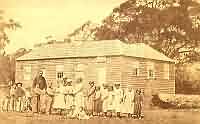 An important exception was New England, notably Massachusetts, in which Colonial Puritans had very
early passed laws that every Town of a certain size would have a school, supported by taxes if parents
could not pay; these were the "common schools" and by 1817 in Boston some 16% of children attended
them and fully 96% of school-age children there received schooling one way or another. The Puritan origins
of this compulsory schooling had to do with religion; the Calvinist leaders wanted to ensure that children
were well-raised in that faith whether parents were diligent in doing so or not. Interestingly, the
tradition remained even as Calvinism was losing ground, during the 1700s, to the more liberal Unitarian religion;
both saw tax-supported schools as useful instruments of indoctrination.
An important exception was New England, notably Massachusetts, in which Colonial Puritans had very
early passed laws that every Town of a certain size would have a school, supported by taxes if parents
could not pay; these were the "common schools" and by 1817 in Boston some 16% of children attended
them and fully 96% of school-age children there received schooling one way or another. The Puritan origins
of this compulsory schooling had to do with religion; the Calvinist leaders wanted to ensure that children
were well-raised in that faith whether parents were diligent in doing so or not. Interestingly, the
tradition remained even as Calvinism was losing ground, during the 1700s, to the more liberal Unitarian religion;
both saw tax-supported schools as useful instruments of indoctrination.
Thus the colonial foundation for government schooling were laid in the 1600s and 1700s...
- by two competing religious movements aiming to indoctrinate children, replacing parents
- with funding by taxation, ie from money stolen at gunpoint
After 1800, the push to build on that foundation and extend government schooling intensified; the two religions were joined by two other interest-groups, and impetus came from overseas.
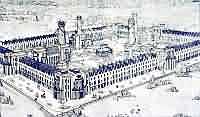 We'll come to the second one later, but the first of those two was led by Robert Owen, a Scot. He had
inherited money, and had ideals compatible with the Unitarians, and in 1825 established with it in New
Harmony, IN a town that today we'd call a "commune." He theorized that if all property was held in
common everyone would cooperate and live in sweetness and light. The phrase had not at that time been
coined, but the Marxist principle "from each according to his ability, to each according to his needs" was
exactly what Owen tried to implement, and it was a total failure - just as had been the original American
Commune in Plymouth, MA - happily abandoned before everyone starved to death.
We'll come to the second one later, but the first of those two was led by Robert Owen, a Scot. He had
inherited money, and had ideals compatible with the Unitarians, and in 1825 established with it in New
Harmony, IN a town that today we'd call a "commune." He theorized that if all property was held in
common everyone would cooperate and live in sweetness and light. The phrase had not at that time been
coined, but the Marxist principle "from each according to his ability, to each according to his needs" was
exactly what Owen tried to implement, and it was a total failure - just as had been the original American
Commune in Plymouth, MA - happily abandoned before everyone starved to death.
One might suppose that the failures in Plymouth and New Harmony might have taught Owen that humans are self-owners and will work to satisfy their own interests as they perceive them - as in our Segment 1. Incredibly, however, Owen was so arrogant that he took the opposite view: that human nature needed to be changed! before a true Socialist paradise was possible, and the way to do that was to implement a large-scale, universal system of re-education; by which he meant, of course, indoctrination. So for the second quarter of the 19th Century, Owenites were on-board the train for government schools, in alliance with the Calvinist-Puritans (with whom he had almost nothing else in common) and the Unitarians.
All three wanted to indoctrinate each rising generation, yet called the process "education"; all three intended to displace parents as child-raisers; and all three planned to do it with stolen money. Such are the sordid origins of American "public schools."
3. The Prussian Model
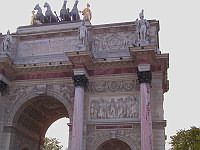 At the very time this political pressure for universal government schooling was mounting in America, there
took place in Prussia a dramatic change of exactly that kind. Prussian armies had suffered defeat by
Napoleon at the turn of the century, and in 1812 King Frederick William III decreed that every child in
Prussia would be schooled at public (ie taxpayer) expense in the virtues of discipline and loyalty to the
State, ie to his own Royal person; he felt that those virtues would provide a proper backbone for future
military success, and he was right. German discipline is legendary and was a key factor in the rise and 12-year rampage of Hitler's government over a century later. King Fred's decree provided that:
At the very time this political pressure for universal government schooling was mounting in America, there
took place in Prussia a dramatic change of exactly that kind. Prussian armies had suffered defeat by
Napoleon at the turn of the century, and in 1812 King Frederick William III decreed that every child in
Prussia would be schooled at public (ie taxpayer) expense in the virtues of discipline and loyalty to the
State, ie to his own Royal person; he felt that those virtues would provide a proper backbone for future
military success, and he was right. German discipline is legendary and was a key factor in the rise and 12-year rampage of Hitler's government over a century later. King Fred's decree provided that:
- Parents had to send their children to the government school, or else to prove that they were providing some alternative, "competent" education
- To enforce that, government agents surveyed all families annually with police help
- Parents were required to ensure that children followed the curriculum provided
- Neglectful parents were to be punished, with severity increasing as their refusal to obey the above laws continued, and could be deprived of any public assistance
- If all such punishments were ineffective, "guardians" were to take charge of their children
- Jewish parents who refused to obey them were to lose all civil rights (!)
By 1819 all that was in place and working, and by 1830 many admirers from other countries had paid visits to study the system. Among them were parties of Unitarians and others from the USA. The three allied groups here quickly adopted the Prussian model as the ideal for America.
Note that compulsion was the essential ingredient in the model - even to the point of removing children from their parents, if they resisted! Funding was by taxation - more compulsion. Government schooling from the very start was therefore antithetical to human nature, to a free society of self-owning sovereigns.
The American visitors reported back and worked hard to persuade State governments to enact copies of the Prussian model - again, notably in Massachusetts. They were not well received; the new country was prospering, government was only slightly intrusive, parents gladly raised their own children at their own expense and were doing well; they saw no need for big change.
4. Horace Mann
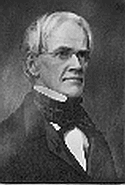 Mann was a Massachusetts politician, by 1837 the Senate President. He had worked to achieve a
reputation as one who could take any cause and pilot it through the legislature to success; and when
in that year the tireless advocates for adoption of the Prussian model in that State succeeded in
getting laws to pass control of "education" from Towns to the State, it was Mann they chose to act
as Secretary of the new Education Board.
Mann was a Massachusetts politician, by 1837 the Senate President. He had worked to achieve a
reputation as one who could take any cause and pilot it through the legislature to success; and when
in that year the tireless advocates for adoption of the Prussian model in that State succeeded in
getting laws to pass control of "education" from Towns to the State, it was Mann they chose to act
as Secretary of the new Education Board.
They were not disappointed; he worked long and hard in his new-found cause, boning up on Prussian theory, touring the Common Schools and touting the new model and in particular, calling for teacher training colleges (called "Normal Schools") to be established under State control to give teeth to its control of what would be taught. Within a decade, the job had been done; government schooling was a fact in Massachusetts and it had, meanwhile, been adopted in several other States and would be adopted in all.
The greatest challenge to the change came in 1841 with a change in Governor, who proposed to abolish the Board of Education and return control to the Towns. Mann earned his keep and justified his reputation as a political "fixer"; the move was voted down, with support from traditionalists because, by then, the second new group in support of government control of schooling, referenced in (2) above, had emerged: a Protestant fear of Roman Catholic influence accompanying a massive and continuing immigration of Irish people to Boston. They were prescient; after the Irish potato famine of 1846, Boston was virtually painted green. They took the view that if government could take control of education with some remnant of Protestantism in its curriculum while a majority still remained, Popery would be kept at bay. The four groups therefore responsible for the transfer of educational control from parent to state were:
- The original Calvinist-Puritans, who wanted to ensure the orthodox raising of children to guard against any parental neglect - but at taxpayer expense
- The later Unitarians, who desired the same thing for their own religious views
- The Owenite Socialists, who expressly intended to redesign human nature by re-education - again at the expense of the victims; and now in the 1840s,
- Most other Protestants, who wished to wall up society against a Roman Catholic invasion; once again, using stolen money to fund the work.
Horace Mann was the politico who glued these disparate interests together and ensured that they prevailed. More than any other individual, therefore, he is the one whom we can blame most for the outcome.
5. "Education" Today
A century and a half after those pro-statist forces won the fight to install government control of what children learn, over the protest of many and without any clear parental demand, we can note the effect. About eight generations of Americans have been subject to the new system, and few current graduates realize that it is that young; that there was ever a time when children were taught at home, or at a for-profit fee-charging school, at parental discretion.It's not a pretty picture.
In the judgement of award-winning teacher John Taylor Gatto (see foot of page) "compulsory state schooling [has at its heart] assumptions and structures that stamp out the self-knowledge, curiosity, concentration and solitude essential to learning. Between schooling and television, our children have precious little time to learn for themselves about the community they live in, or the lives they might lead. Instead, they are schooled merely to obey orders and become smoothly functioning cogs in the industrial machine." Devastating!
In that of veteran ABC News reporter John Stossel (likewise) "We cheat our kids" and even in comparison to foreign government schools, American ones rank low in performance: "18th in reading, 22nd in science, 28th in math - behind countries like Poland, Australia and Korea."
The four groups (above) that helped bring government schools into being fared poorly. The Puritans and Unitarians wanted to hold power in the new monopoly of indoctrination; they have virtually none. Other Protestants (#4) do have influence on School Boards, but completely failed in their objective of stemming Popery; the Roman Catholics merely founded their own low-cost parochial schools and attained enough political clout to prevent them being outlawed; with the result that they educate their own children better, and so have attained an influence beyond their numbers in society. All three groups violated one of their principles ("Thou shalt not steal") so the justice of that is especially poetic. The Owenite Socialists (#3) were more successful, in that America today could be called a Socialist country, but certainly fell far short of Owen's aims - to change human nature (!) and replace private property with communes.
 In the home-schooling community (around a million parents keep their children out of government
schools and teach them at home) it is commonplace that, when tested, those homeschooled
students are about
two grade-years ahead of their neighbors in government school. That's despite the fact that
most of those parents have no formal teaching skills and virtually no teaching aids that are normal
equipment in classrooms. But that result is exactly what one should expect, given (see main-para #1 above)
that they are answering student questions instead of indoctrinating those in their care. They
are providing education.
In the home-schooling community (around a million parents keep their children out of government
schools and teach them at home) it is commonplace that, when tested, those homeschooled
students are about
two grade-years ahead of their neighbors in government school. That's despite the fact that
most of those parents have no formal teaching skills and virtually no teaching aids that are normal
equipment in classrooms. But that result is exactly what one should expect, given (see main-para #1 above)
that they are answering student questions instead of indoctrinating those in their care. They
are providing education.
Government schools deliver poor performance - after their century and a half of opportunity to perfect the system - a large minority of graduates cannot properly read. Award-winning teacher John Gatto estimates that given good motivation and serious intent, the basics of reading and math could be taught to any child in about 100 hours; it takes government schools 12 years, and still they often fail. But that is exactly what one should expect, given that (as above) "learning seldom takes place in a classroom."
Government schools inevitably divide the community because the system provides levers of power (over the curriculum) for competing interests to grab. In recent decades the main dispute has been about origins: shall students be taught evolution, or creation, or some mix? Sex, too, has been contentious; shall schools teach that to children, or not, and if so in what way and with what moral content and at what age? These are problems that a free market (with many, competing schools) could readily solve - but that they should fester is exactly what one should expect of a monolithic monopoly.
Government schools are horribly expensive compared both to homeschooling (by a factor of about four) and to those private schools that cater for low-income parents (by factors of two to four.) But again, waste is exactly what one should expect when the "customer" must pay the monopolist's fees before going on to buy services from one of the few rivals. Imagine having to pay Exxon $3 a gallon before going on to fill the gas tank at a Citgo station! Absurd! Yet that is exactly what this system does.
Government schools penalizes the poor and are arguably racist, despite the oft-quoted "justification" that they exist primarily to benefit those who could not afford private, fee-charging schools. Reason: variation in their quality favors white, affluent suburbs. Those schools are relatively good; ones in the ghetto are places where learning is virtually impossible and which teachers will avoid if they can. Therefore, better teachers stay away from the poorer districts - which are often in Black neighborhoods. The monopoly therefore keeps the poorest, the most ill-educated and that result is exactly what one should expect in a system designed around the Prussian model, with its aim of imposing order rather than imparting knowledge.
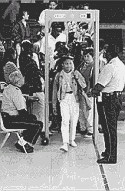 Government school entrances feature metal detectors in an attempt to exclude guns! Students
try to bring guns to school for the reasonable purpose of self-protection; the fact that they feel such a
need is conclusive proof, if more were needed, that the system is irreparably broken - that learning
is one of the last things that can take place in such an institution. But that is exactly what one should
expect, with attendance compelled; you treat children like prisoners, they will behave like
delinquents.
Government school entrances feature metal detectors in an attempt to exclude guns! Students
try to bring guns to school for the reasonable purpose of self-protection; the fact that they feel such a
need is conclusive proof, if more were needed, that the system is irreparably broken - that learning
is one of the last things that can take place in such an institution. But that is exactly what one should
expect, with attendance compelled; you treat children like prisoners, they will behave like
delinquents.
Government schools are so unbearably boring as to drive children to seek relief in narcotics, and instead of fixing the source of that problem they savagely hunt down the drugs, sometimes with strip searches that can traumatize and permanently damage innocent young children. But that is exactly what one should expect, when customers are treated like cattle and herded from one enclosure to another every 45 minutes, regardless of any interest they might have in the subjects being "taught."
Government school teachers are vulnerable to attack, verbal and physical, including rape. But that is exactly what one should expect, when they are made to act like prison guards than valued sources of wisdom.
Naturally that drives teachers to seek protection in unions, and over the years those have become so powerful as to be virtually managing the system; to quote Gatto again, government schools have long since ceased to be centers of learning and are now make-work centers for union members. In a 2006, ABC-TV program reporter John Stossel took the lid off schools in New York, and roundly criticized teacher unions for making it impossible to reward good teachers more than bad ones, and almost impossible to fire the worst. Union reaction after the broadcast was a paroxism of fury. But again, that's exactly what one should expect; a monopoly employer naturally provokes formation of a strong, monopolistic employee association.
To force children to attend government schools for their twelve most formative years is a textbook example of wholesale child abuse and all in all, government schools provide a perfect example of the principle we named in Segment 2 of TOLFA: garbage in, garbage out.
6. Segment Review
Of all government functions, schooling (we now know not to call it "education"!) is the most pervasive and influential; a citizen may never encounter its justice system or its military, but everyone will endure its twelve year youth indoctrination camps. So this Segment has been the longest so far, and is surely one of the most important in TOLFA.Make sure it's well assimilated before moving on, by answering for yourself the Questions below; and as usual take up with your Mentor anything in need of clarification.
For further reading:
The Alliance for the Separation of School and State
The Why of Home School
Battleships and Schools
i suport publick skools
Home's Best
"Is Public Education Necessary?" by Samuel Blumenfeld
"Public Schools, Public Menace" by Joel Turtel
"Dumbing Us Down" by John Taylor Gatto
"Stupid in America" - YouTube freevideo by John Stossel